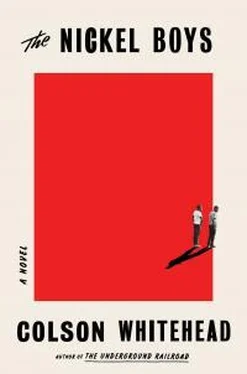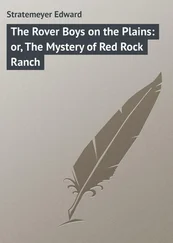Колсон Уайтхед - The Nickel Boys
Здесь есть возможность читать онлайн «Колсон Уайтхед - The Nickel Boys» весь текст электронной книги совершенно бесплатно (целиком полную версию без сокращений). В некоторых случаях можно слушать аудио, скачать через торрент в формате fb2 и присутствует краткое содержание. Год выпуска: 2019, Издательство: Penguin Random House LLC, Жанр: roman, на английском языке. Описание произведения, (предисловие) а так же отзывы посетителей доступны на портале библиотеки ЛибКат.
- Название:The Nickel Boys
- Автор:
- Издательство:Penguin Random House LLC
- Жанр:
- Год:2019
- ISBN:нет данных
- Рейтинг книги:4 / 5. Голосов: 1
-
Избранное:Добавить в избранное
- Отзывы:
-
Ваша оценка:
- 80
- 1
- 2
- 3
- 4
- 5
The Nickel Boys: краткое содержание, описание и аннотация
Предлагаем к чтению аннотацию, описание, краткое содержание или предисловие (зависит от того, что написал сам автор книги «The Nickel Boys»). Если вы не нашли необходимую информацию о книге — напишите в комментариях, мы постараемся отыскать её.
), that the world began to care.
The Nickel Boys — читать онлайн бесплатно полную книгу (весь текст) целиком
Ниже представлен текст книги, разбитый по страницам. Система сохранения места последней прочитанной страницы, позволяет с удобством читать онлайн бесплатно книгу «The Nickel Boys», без необходимости каждый раз заново искать на чём Вы остановились. Поставьте закладку, и сможете в любой момент перейти на страницу, на которой закончили чтение.
Интервал:
Закладка:
The house father noticed the change in Elwood’s expression. “Not what you expected?”
“I was going to take college classes this year,” Elwood said. It was October; he would have been deep into the semester.
“Speak to Mr. Goodall about it,” Blakeley said. “He teaches the older students. I’m sure you can come to an arrangement.” He smiled. “You ever worked a field?” he asked. They grew multiple crops on the 1,400 acres—limes, sweet potatoes, watermelon. “I came up on a farm,” Blakeley said. “A lot of these kids, it’s their first time taking care of anything.”
“Yes, sir,” Elwood said. There was a tag or something in his shirt; it kept sticking him in the neck.
Blakeley stopped. He said, “You know when to say, Yes, sir— which is always—you’ll be okay, son.” He was familiar with Elwood’s “situation”—his intonation swaddled the word in euphemism. “A lot of the boys here, they got in over their heads. This is an opportunity to take stock and get your head right.”
Cleveland was identical to the other dormitories on the campus: Nickel brick under a green copper roof, surrounded by box hedges that clawed out of the red soil. Blakeley took Elwood through the front door and it was swiftly clear that outside was one thing and inside another. The warped floors creaked incessantly and the yellow walls were scuffed and scratched. Stuffing dribbled from the couches and armchairs in the recreation room. Initials and epithets marked the tables, gouged by a hundred mischievous hands. Elwood fixated on the housekeeping chores Harriet would have ticked off for his attention: the fuzzy haloes of finger grime around every cabinet latch and doorknob, the balls of dirt and hair in the corners.
Blakeley explained the layout. The first floor of each dorm was taken up by a small kitchen, the administration offices, and two large assembly rooms. On the second were the dorm rooms, two of them for the high-school-age students and one reserved for the younger kids. “We call the younger students ‘chucks,’ but don’t ask me why—nobody knows.” On the top was where Blakeley lived and some utility rooms. The boys were heading to bed, Blakeley told him. The dining hall was a walk and they were wrapping up supper, but did he want something from the kitchen before they closed for the night? Elwood couldn’t think of food, he was too knotted up.
There was an empty bed in room 2. Three rows of bunks stretched over the blue linoleum, each row with ten beds, each bed with a trunk at the foot for the boy’s things. No one had paid Elwood any attention on the walk over, but in here each boy took his measure, some of them conferring quietly with their buddies as Blakeley took him down the rows and others filing away their appraisals for later. One boy looked like a thirty-year-old man, but Elwood knew that was impossible since they let you out when you turned eighteen. Some of the boys carried themselves rough, like the white boys in the car from Tampa, but he was relieved that a lot of them looked like regular guys from his neighborhood, just sadder. If they were regular, he’d make it through.
Despite what he’d heard, Nickel was indeed a school and not a grim jail for juveniles. Elwood had gotten off lucky, his lawyer said. Stealing a car was a big-ticket offense for Nickel. He’d learn that most of the kids had been sent here for much lesser—and nebulous and inexplicable—offenses. Some students were wards of the state, without family, and there was nowhere else to put them.
Blakeley opened the trunk to show Elwood his soap and towel, and introduced him to the boys who slept on either side of him, Desmond and Pat. The house father instructed them to show Elwood the ropes: “Don’t think I won’t be watching you.” The two boys mumbled hello and returned to their baseball cards once Blakeley disappeared.
Elwood had never been much of a crier, but he’d taken it up since the arrest. The tears came at night, when he imagined what Nickel held in store for him. When he heard his grandmother sobbing in her room next door, fussing around, opening and closing things because she didn’t know what to do with her hands. When he tried without success to figure out why his life had bent to this wretched avenue. He knew he couldn’t let the boys see him weep, so he turned over in the bunk and put his pillow over his head and listened to the voices: the jokes and taunts, the stories of home and distant cronies, the juvenile conjectures about how the world worked and their naïve plans to outwit it.
He’d started the day in his old life and ended it here. The pillowcase smelled like vinegar, and in the night the katydids and crickets screeched in waves, soft then loud, back and forth.
Elwood was asleep when a different roar commenced. It came from outside, a rush and a whoosh without variation. Forbidding and mechanical and granting no clue to its origin. He didn’t know which book he’d picked it up from, but the word came to him: torrential.
A voice across the room said, “Somebody’s going out for ice cream,” and a few boys snickered.
CHAPTER FIVE
Elwood met Turner his second day at Nickel, which was also the day he discovered the grim purpose of the noise. “Most niggers last whole weeks before they go down,” the boy named Turner told him later. “You got to quit that eager-beaver shit, El.”
A bugler and his brisk reveille woke them most mornings. Blakeley rapped on the door of room 2 and yelled, “Time to get up!” The students saluted another morning at Nickel with groans and cussing. They lined up two by two for attendance, and then came the two-minute shower where the boys furiously lathered with the chalky soap before their time ran out. Elwood put on a good show of acting unsurprised by the communal showers but had less success hiding his horror at the frigid water, which was searching and merciless. What came from the pipes smelled of rotten eggs, as did anyone who bathed in it until their skin dried.
“Now it’s breakfast,” Desmond said. His bunk was next to Elwood’s and the boy made an effort to fulfill the house father’s orders from the night before. Desmond had a round head, chubby baby cheeks, and a voice that startled everyone the first time they heard it, it was so gruff and full of bass. His voice made the chucks jump when he crept up on them, and he got a kick out of it, until one day a supervisor with an even deeper voice crept up on him and taught him a lesson.
Elwood told him his name again, to signal a new start to their acquaintance.
“You told me last night,” Desmond said. He laced his brown shoes, which were impeccably polished. “If you’ve been here a while, you’re supposed to help out the Grubs, so you can get points. I’m halfway to Pioneer.”
He walked with Elwood the quarter mile to the dining hall, but they got separated in the chow line, and when Elwood looked for a place to sit he didn’t see him. The mess hall was loud and rowdy, full of all the Cleveland boys serving up their morning round of nonsense. Elwood was invisible again. He found an empty seat at one of the long tables. When he neared, a boy slapped his hand on the bench and said it was saved. The next table over was filled with younger kids but when Elwood put his tray down they looked at him like he was crazy. “Big kids aren’t allowed to sit at a little-kids table,” one of them said.
Elwood sat down quickly at the next free spot he saw and to head off rebuke didn’t make eye contact, just ate. The oatmeal had a bunch of cinnamon dumped into it to hide a lousy taste. Elwood gobbled it down. He finished peeling his orange before he finally looked up at the boy across the table who had been staring at him.
The first thing Elwood noticed was the notch in the boy’s left ear, like on an alley cat that had been in scrapes. The boy said, “You eat that oatmeal like your mama made it.”
Читать дальшеИнтервал:
Закладка:
Похожие книги на «The Nickel Boys»
Представляем Вашему вниманию похожие книги на «The Nickel Boys» списком для выбора. Мы отобрали схожую по названию и смыслу литературу в надежде предоставить читателям больше вариантов отыскать новые, интересные, ещё непрочитанные произведения.
Обсуждение, отзывы о книге «The Nickel Boys» и просто собственные мнения читателей. Оставьте ваши комментарии, напишите, что Вы думаете о произведении, его смысле или главных героях. Укажите что конкретно понравилось, а что нет, и почему Вы так считаете.

![Колсон Уайтхед - Подземная железная дорога [litres]](/books/411182/kolson-uajthed-podzemnaya-zheleznaya-doroga-litres-thumb.webp)










